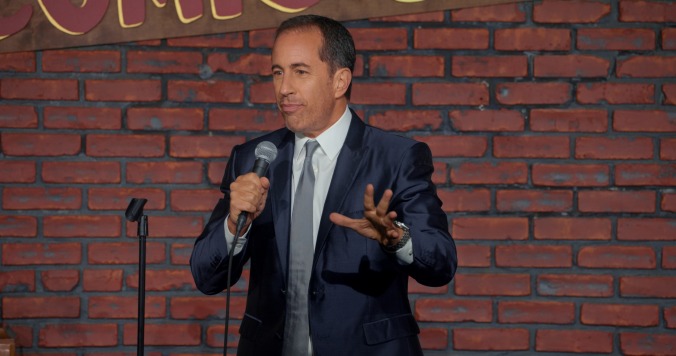And that’s not an inconsiderable pleasure. Seinfeld works the cramped stage of his old haunt with not only the effortless and inevitable confidence of the old pro and cultural touchstone he is, but with an enthusiasm belying any hint of obligation. “You gonna play ‘Changes’?,” asked Seinfeld of Bowie in response back on SNL, and Bowie deadpanned an identical shamefaced, “yeah.” But the thing is, latter-day Bowie playing “Changes” could be an astoundingly entertaining experience, and hearing Jerry Seinfeld crank out stream-worn, meticulously fashioned bits about NYC street sweepers, sports fandom as “rooting for laundry,” or being bored into catatonia as a child at the bank, while not revelatory, is undeniably fun. As seen in his decision to start over comedically from scratch (documented in the 2002 film Jerry Seinfeld: Comedian), and the thoughtful shop-talk that forms the backbone of his streaming series Comedians In Cars Getting Coffee, Seinfeld’s comic instincts aren’t dormant. But the nearest things to “the new shit” we get here are a few references to Uber and eHarmony.com, and even those hardly figure into the nostalgic vibe as anything more than fleeting reminders of what year we’re in.
If there’s a deliberately, stubbornly innocuous tone to Seinfeld’s act, well, that’s Seinfeld’s act. Jokes about relationships (guys buy flowers when they’ve screwed up, and what’s the deal with women and cotton balls?) partake of the same glib man-woman stereotypes, but they’re also so rooted in the stand-up tradition that Jerry Seinfeld grew up idolizing (and then embodying) that the hackiness is part of their appeal. Seinfeld, for all the infrequent hints about having actual, even controversial opinions about real-world things, is overwhelmingly about observation, not confession. (The closest he comes here to addressing the current political climate is falling back on the old bit about anyone who thinks they’re just the person to be president is clearly nuts.) And that’s Jerry Before Seinfeld’s greatest real weakness, as the special, intended to serve as an act of personal as well as professional reminiscence, truly excels only at the latter.
Interspersed with anecdotes about his early days in stand-up, clips of the comic surrounded by his old comedy albums, issues of Mad magazine, and—in one contrived but still-striking image—a New York street paved with purported pages from his actual accordion file of jokes, Jerry Before Seinfeld forms an unsatisfying portrait of the artist as a young comic. When grainy clips of the young Seinfeld play over wistful instrumental music, the intended effect is undercut by the sight of the present-day Seinfeld’s obvious comfort in his role as unfathomably wealthy, universally respected comic elder statesman. Seeing the fresh-faced Seinfeld waving goodbye after his first 1981 guest spot on Carson’s Tonight Show fade into that of the now sixtysomething Seinfeld doing the same to a packed club of adoring fans doesn’t evoke anything but the reflection that those same jokes still work after all these years. The special sets up this performance as a more intimate experience than it turns out to be.
In one voice-over, Seinfeld alludes to fellow king of comedy Richard Pryor, asking rhetorically if he, Seinfeld, would have been funnier if he grew up in a whorehouse in Peoria. Sure, he concedes, referring to his own relatively stable upbringing, “but this is what I had to work with.” Fair enough. Jerry Seinfeld imitators are are long gone from the business, with his signature cadence and style revealed to be just exhausting window dressing in those without Seinfeld’s talent for making complaints about everyday absurdities uniquely funny. Talking about Mad, Seinfeld explains that the magazine’s irreverence awakened in him the idea that “You don’t have to buy that. You can say ‘That’s stupid.’” And Seinfeld’s persona has built up around that pearl of wisdom, accompanied by an added layer summed up in, naturally, an old bit about the cereal Cookie Crisp alerting parents to how much crap they were letting their kids eat. “Someone always comes along and pushes a good thing too far,” is as fitting a theme for Jerry Before Seinfeld, a special that gives the comic’s fans exactly—and only—what they want.

 Keep scrolling for more great stories.
Keep scrolling for more great stories.
